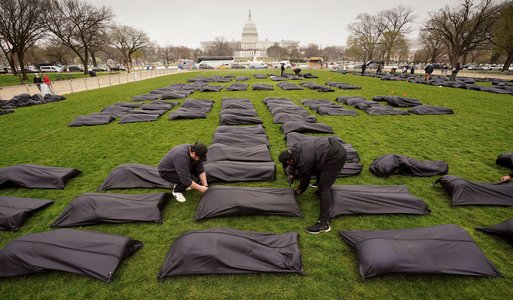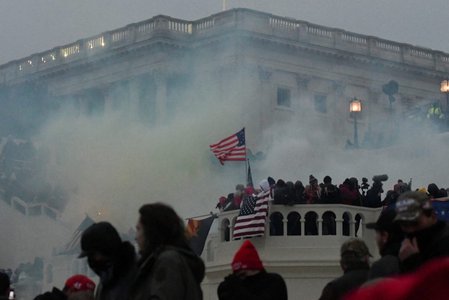Since the massacre in Buffalo three weeks ago on May 14, there have been at least 37 mass shootings in the United States, including in Uvalde, Texas and Tulsa, Oklahoma. In an address to the nation this week, President Biden called for action to contend with the spate of gun violence, as a bipartisan group of lawmakers tries to hammer out a deal on a gun reform bill.
Clip: Biden calls for new gun laws amid ongoing debate in Congress
Jun. 03, 2022 AT 5:51 p.m. EDT
TRANSCRIPT
Notice: Transcripts are machine and human generated and lightly edited for accuracy. They may contain errors.
Alcindor : Across the country, there is shock and frustration since the massacre at Buffalo three weeks ago, there have been more mass shootings than there have been days.
To be exact, since May 14th, there have been at least 37 mass shootings in this country. That is according to the nonprofit Gun Violence Archive. One of those was on Wednesday in Tulsa, Oklahoma. There, a gunman walked into a medical building and allegedly killed four people and himself.
And in Uvalde, Texas, funerals have begun for the 21 students and teachers shot to death at Robb Elementary School last week.
In a primetime speech, President Biden addressed the nation.
Biden : After Columbine, after Sandy Hook, after Charleston, after Orlando, after Las Vegas, after Parkland, nothing has been done. This time, that can’t be true. This time, we must actually do something. For God’s sake, how much more carnage are we willing to accept? How many more innocent American lives must be taken before we say enough?
Alcindor : Meanwhile, a bipartisan group of lawmakers working to hammer out some sort of gun reform bill say a, quote, framework for a deal is close.
Joining me tonight to discuss and more, Eugene Daniels, "Playbook" author and White House correspondent for "Politico", and Annie Karni, congressional reporter for "The New York Times".
There’s so much going on. I want to start, of course, with you, Eugene, because there was this primetime speech. President Biden laid out so many things that he wants to see happen. But what’s the sense inside the White House and how much the president can really influence Congress to pass something?
Eugene Daniels, White House Correspondent, Politico : Yeah, what you saw yesterday was the president talking to a bunch of different audiences. First was members of Congress where he was saying these are the things I want to do. And this list we heard from him when he was heading up to the gun task force during the Obama administration after Sandy Hook, talking about a ban on assault rifles, talking about -- assault weapons, talking about a registry, talking about red flag laws. These kinds of things have a lot of bipartisan support among voters.
And also more importantly, talking to the American people and channeling their frustration. The administration thinks it went well, that the speech did what it was supposed to do. But the problem is and what you did not hear was executive action he is thinking of doing. That’s because a sense in the White House, they have felt the did what they can do, and their hands are tied when it comes to the executive action that they have left.
They’ve done I think four different haunches of executive action on guns and safety laws. They cannot do much more. They are now worried watching members of Congress go through what we have seen over and over again, which is a bipartisan effort, come together to help something happens, and waiting on pins and needles to see if it does.
Alcindor : And, Annie, the president at one point said "I told you what I want to do," and he said, the question is, what will Congress do? Of course, that brings that squarely on your beat, all eyes are on this bipartisan lawmakers. What more do we go, the framework they are close to or have settled on? Is it going to happen?
Annie Karni, Congressional Reporter, The New York Times : It looks like something -- people are optimistic something is going to happen. Senator Cornyn from Texas made a statement saying it would be embarrassing if we got nothing done. It was seen by advocates, a lot of people watching as a strong statement to make, indicating that something will happen. Now, the question is how modest is it going to be? Most Democrats have been burned so many times in this kind of debate and assume it will be modest, it will not be lowering the age to buy an assault weapon, something modest on background checks and red flag laws.
But modest is also -- getting something done to show legislation can pass in the Senate, there can be 60 votes and the sky doesn’t fall, and that they can start chipping away at the inability to do anything. What I’m really struck by is that there’s broadly the sense that every time one of these tragedies happens, nothing is going to change. Yet among Democrats working on the issue, activists in this world, they are optimistic.
They take a long view and feel something that will look small potentially matters quite a bit. But modest is kind of the best hope here.
Alcindor : And it’s really interesting that he said, because I remember covering Newtown, Connecticut, and the shooting at Sandy Hook Elementary School. I thought the world was going to change. I now think of that, as a decade ago, as a naive reporter because, of course, nothing changed. But it does seem like you said this time is a little different.
I do want to go to you, Eugene, because in "Playbook" today, you pointed out that in February 2020, President Biden had this gun speech hoping to win Nevada. When he was down and needing to win in the primaries in 2020, he pledged he would have gun legislation who first day in office and it didn’t happen.
Connect that February 2020 speech to the pressure the president is feeling now.
Daniels : Yeah, because he made a lot of promises in the campaign trail. We all remember all of the Democrats did, because they were thinking about how we can possibly beat Donald Trump. We have to get not just the base, which is Black voters and they’re a little bit more moderate, you have to get liberals very excited to vote. So, that’s what he did.
He made very large promises on what he was going to be able to do with gun legislation. Not knowing he would have 50 Democratic senators to do something, anything on pieces of legislation. And so, now, as you watch different constituencies that are really important to the administration, whether that is gun control advocates, whether that’s civil rights groups because of issues like what happened in buffalo -- all of those different groups are pushing and talking to the administration asking what are you doing?
And like I said, they have done a lot of executive action they feel like they can do, but they wanted to see the president get out more. He hasn’t been super involved in the negotiations on what is happening with the bipartisan effort, wanting to give the senators time and space to do that. It’s not always helpful for a president to jump in and try and help negotiate on a bipartisan effort, but that was giving advocates a little pause about what he was going to do.
Alcindor : And I want to follow up, because there have been more than 200 mass shootings this year. Polling shows that Americans over and over again say that they are back -- they are open to backing things like changes in background checks.
Does the White House have a sense it will change? That all of this cultural things and the polling is kind of giving this sense of urgency that something will really be done?
Daniels : I think they are hopeful, you know what I mean? But they just like all of us, watched Sandy Hook happen and nothing happened. A lot of folks working at the White House now or either working for President Biden or somewhere in the administration at that time, so they have been burned on this issue before.
And so, when you talk to folks what they say is, they are encouraged about what they see, not thinking something huge is going to happen. But they hopeful that if you look at -- you know, you break a little crack in the dam, and have flooding rush in and changes happening -- Senator Chris Murphy who’s leading this for Democrats, he’s been telling reporters if I can get my Republican colleagues to realize the world is not going to end if we get something done on legislation, maybe we can do this again."
Alcindor : And, Annie, the crack in the dam. I like that metaphor because in some ways, it is if they can get a little thing done, it can overflow. I’m also really interested in asking you about this, I was thinking about it all day, and I was like, can’t wait to talk to Annie about this.
And it’s the House bill. There’s a bill happening. It’s going forward. What is the point of it if we know it will not be passed in the Senate?
Karni : Well, I mean, it’s still important to show support. And it -- now, the House bill, there is a passed bill that Senator Schumer now has to decide next week, like he has to give them space to have these negotiations. And he has to decide like am I going to bring up that House bill for a vote?
Or some -- I have to bring at some point if there is not going to be a compromise, I’m not going to bring a vote and it can be a show vote. He’s had many -- you know, Congress does this a lot. A vote they know will fail, but it has to show where everyone stands.
Alcindor : Yeah.
Karni : So, they think, you know, 70 percent of the country supports background checks. Republicans will have to stand there and vote no for something that has broad popular support.
So, I think it’s just important for -- you know, they wanted -- they can -- the House can pass a bill like that, why wouldn’t they, and then say, it’s on to you, to the Senate to take some action? That there is a bill waiting for them to vote on if it comes to that.
I think next week, the real question for Schumer will be do we have to take a vote on a bill that will fail, or is this bipartisan group going to come out with a framework? Obviously, they’d rather pass legislation than have a show vote.
Alcindor : And another question I had for you, Representative Chris Jacobs is this Republican who represents a district that is 10 miles from where Buffalo, New York, where that massacre happened, where 10 black people were killed.
He came out and said that he actually was in support of a federal assault weapons ban. And then, now, he faced a lot of GOP backlash and he’s no longer running for reelection.
Tell me a little bit about what he is going through, tell us about the political states that Republicans are facing.
Karni : I mean, I think he lasted seven days after coming out against -- for gun control efforts. And now, he, today, the story broke that he is not running for reelection anymore. I mean, that should temper anyone who is incredibly hopeful right now about the party, where the Republican Party is, the control that the NRA still has even in its diminished state over Republican lawmakers. There is no grade that’s more important to a lot of people, there is no issue that defines the party so much as the Second Amendment. That just states the feeling about government, the feeling about independence, and your own rights as this issue.
So, you know, it is a cautionary tale for anyone feeling like -- we watched the slaughter of schoolchildren and now, there’s going to be some big moment. And you just look at what happened, seven days after coming out for gun control efforts, he’s out of the race.
Alcindor : Yes.
Daniels : But despite all of the popular support that we know all and we talk about every time there is one of these shootings, there is not a lot of political incentive for Republicans to do that. Obviously, he is a perfect example.
When you talk about voters, things like gun control and abortion do not rise to the levels of that, you know, Democrats or the people who want to see this change would want. It’s about the economy. It’s about inflation.
FROM THIS EPISODE


Clip: White House shifts messaging on inflation and the economy ahead of midterms


Full Episode: Washington Week full episode, June 3, 2022


Special: Jan. 6 committee set to begin public hearings after 11-month investigation

© 1996 - 2026 WETA. All Rights Reserved.
PBS is a 501(c)(3) not-for-profit organization
